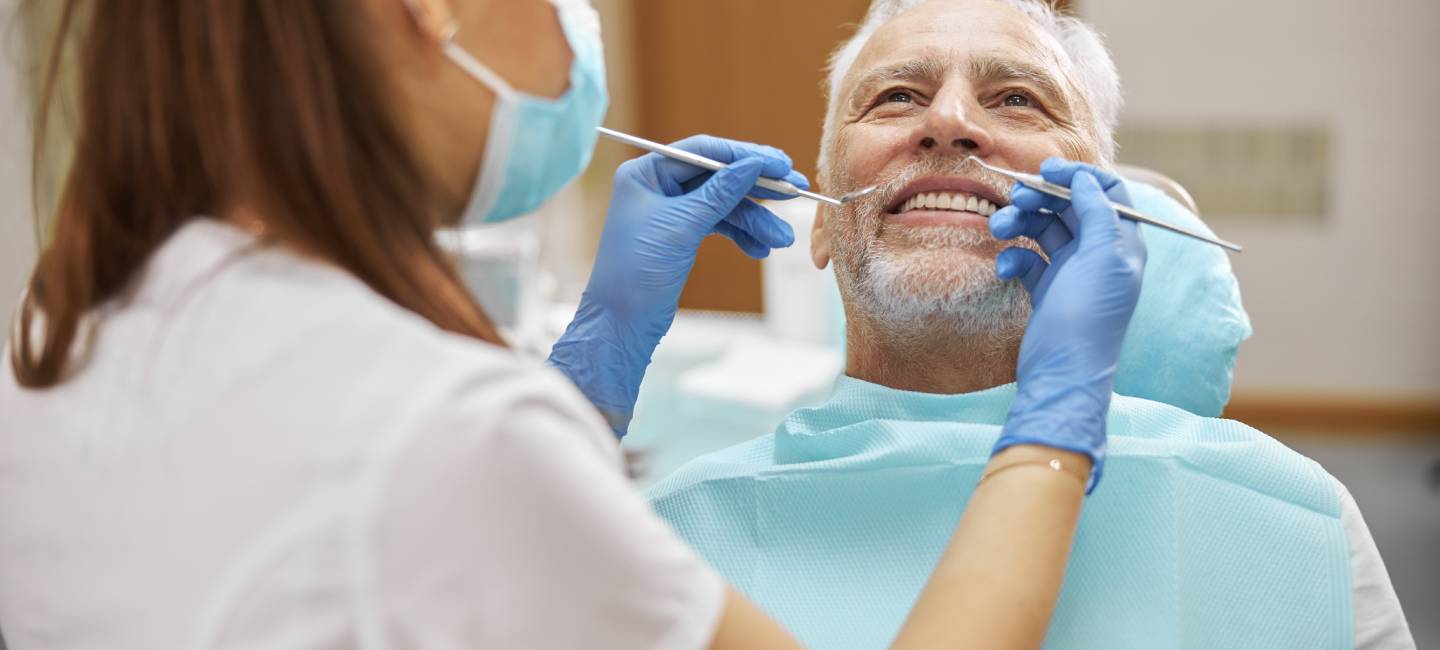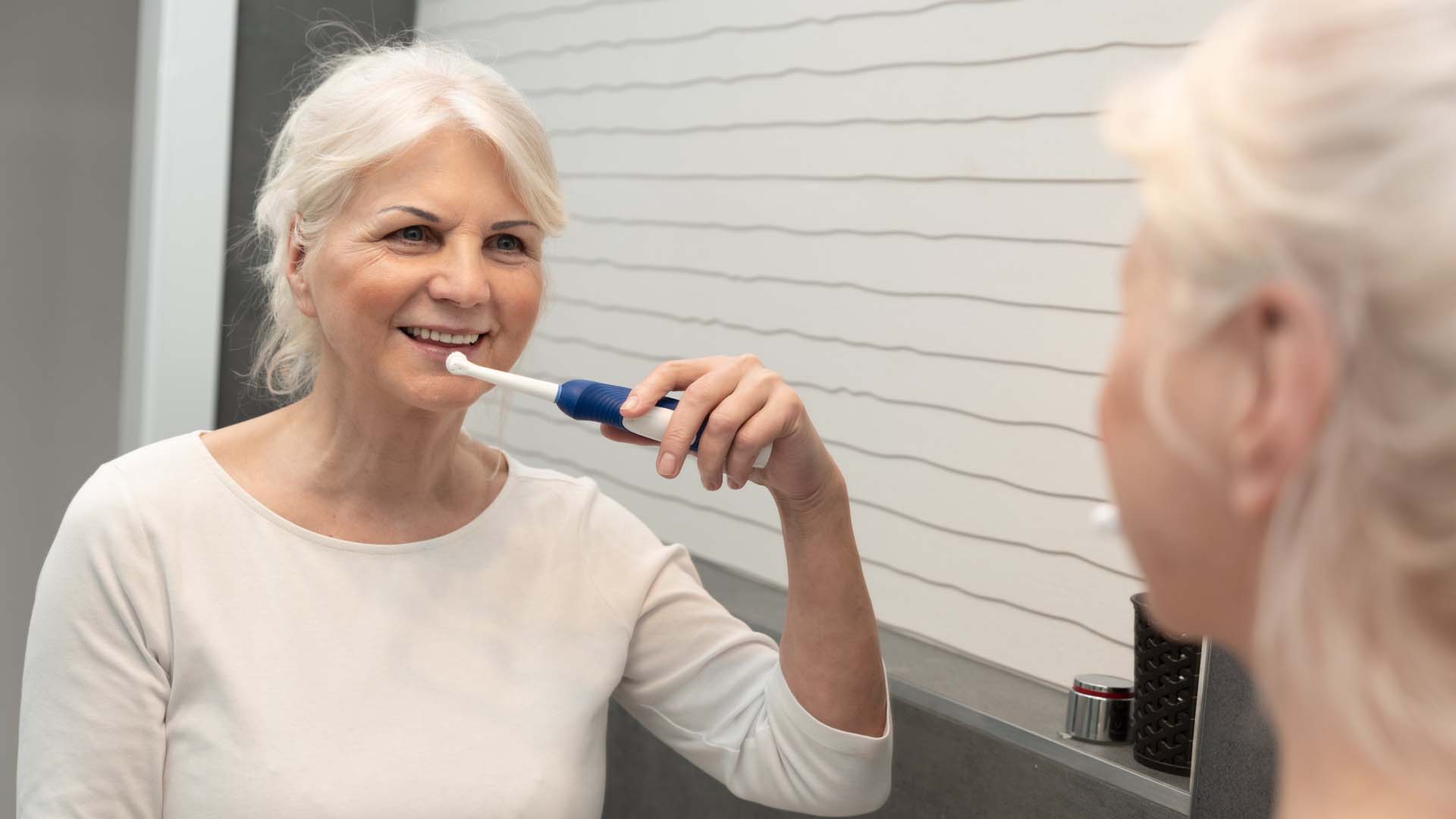
This article is for general guidance only and is not financial or professional advice. Any links are for your own information, and do not constitute any form of recommendation by Saga. You should not solely rely on this information to make any decisions, and consider seeking independent professional advice. All figures and information in this article are correct at the time of publishing, but laws, entitlements, tax treatments and allowances may change in the future.
Finding an NHS dentist can sometimes feel like an impossible task. The alternative is private dental treatment, but the fear of high costs can be a real barrier to getting essential treatment. But going private doesn’t have to mean draining your savings.
Here, we reveal what you can expect to pay for everything from a check-up to a crown, and explore the payment plans and insurance options that can make the bill far more manageable.
What’s on this page?
Just over half of adults in England have an NHS dentist, but the number falls below half among the over-55s, according to the Office for National Statistics. Over-75s are least likely to have an NHS dentist, at just 45%. The same statistics show that of those who tried to find a NHS dentist, only one in five were successful (in figures for March-April 2025).
The scale of the problem hit the headlines at the end of 2024 when 100 patients queued outside a Warrington dentist at 2.30am, just to get a coveted place on its NHS register.
The situation is only slightly better in the rest of the UK. Llais, the health and social care body for Wales, says one-third of people in Wales are unable to find a dentist or stuck on lengthy waiting lists. It says people are having to travel further or pay more to go private.
In Scotland, BBC News research found that just one in four dentists could offer treatment to new patients within three months. And six Scottish council areas are ‘dental deserts’ where no practices were able to take on new patients within three months.
Michelle Cooper, director of health and travel at Saga Insurance, says the shortage of NHS dentists is a factor in many older people having to pay for private dentistry. “For many people, accessing an NHS dentist is a real challenge. Long waiting lists and a lack of practices accepting new NHS patients mean that lots of people struggle to get the dental care they need, with the result being that many people are forced to do without. We know that there is variation between areas – and certainly in some places in the UK it’s a severe problem.
“It’s an important issue, since oral health issues, such as gum disease, can get worse as you get older and can affect your physical health too. For example, gum disease has been linked with dementia as well as with heart disease.”
She adds: “Dental examinations are free in Scotland and for over-60s in Wales, but some people are still having issues accessing NHS dentists in the first place. In some areas there are many people without an NHS dentist to treat them.”
When you see an NHS dentist in England, you’ll pay a capped price for treatment that is ‘clinically necessary’.
Chris Steele, founder of insurance information provider MyTribe, explains how the system works: “Dental treatment is split into three bands, each costing a fixed amount. Band one costs £27.40 and covers dental exams, diagnosis and guidance. It also covers X-rays, and a scale and polish if your dentist deems it necessary.
“Band two includes fillings and root canal treatment alongside treatments such as extractions and costs £75.30. Band three is the highest group and covers more extensive dental work, including dentures, crowns and bridges, and charges £326.70.”
You can only get free dental treatment on the NHS in England if you claim certain benefits, for example the guarantee element of pension credit, universal credit or income support. The system and costs are different in other parts of the UK. In Scotland everyone gets free dental check-ups, while in Wales, free check-ups are available to over-60s.
Wherever you live, costs for private dental treatment are subject to the law of supply and demand and unfortunately, the shortage of NHS dentists is only serving to drive prices up.
Steele says: “As NHS dentistry becomes increasingly inaccessible, private dental costs in the UK have soared, leaving patients struggling to afford essential care. The ongoing NHS dental crisis is clearly having a knock-on effect. As more patients switch to private care, we’re seeing demand surge, particularly for urgent and complex procedures. Add steep inflation and higher staffing costs, and you’ve got a perfect storm for price rises.”
He adds that since 2022, the average price for a simple tooth extraction has risen by 32% from £105 to £139.
While private dental treatment is more costly, Dr Shabnam Zai, a dentist at West House Dental in north-west London, points out that the service is different too. You’ll find it easier to get appointments, have more time in the chair and get access to treatment and materials that aren’t available on the NHS. This includes cosmetic treatments, like tooth whitening and improving the appearance of fillings.
She says: “Most NHS dentists have five to 10 minutes per appointment for a new patient, while I book 45 minutes to one hour for a new patient. I like to get to know my patients and build trust and a relationship.”

MyTribe has conducted research amongst hundreds of private dentists across the UK, to reveal the average cost of common services and treatments:
Dr Zai adds that patients can expect to pay from £500 to £900-plus for crowns and between £250 and £600 for teeth whitening. Invisalign (for teeth straightening without braces) costs between £2,000 and £5,000.
It’s important to note that costs will vary according to location, expertise and the services offered by your dentist.
Toby Hancock, a spokesperson for the British Dental Association, says charges should be transparent with price lists clearly visible in the waiting room and on their website. “These are often a ‘from’ figure, as an itemised quotation will be given to each patient as part of their treatment plan. This amount will reflect the ‘from’ figure with addition of difficulty, challenges and circumstances taken into account,” he explains.
Going to the dentist can be painful enough without the worry about how you’ll pay the bill. However, there are ways to manage the costs of private treatment or take the sting out of a shock bill.
There are three key products to consider as an alternative to simply paying for each treatment as it comes.
1. Dental payment plans
Dental plans are arranged via your dentist through companies such as DenPlan or Practice Plan. Your dentist will look at your teeth, work out what treatment will be required over the course of a year and let you spread the cost through monthly repayments.
2. Healthcare cash plans
A healthcare cash plan (from companies including Simplyhealth, WPA or BHSF) will let you claim a fixed cash payment every time you see the dentist. In addition to the dentist, you’ll also be able to claim for other everyday health expenses like physiotherapy or optician visits.
Some employers provide these plans. “If you’re still working, check whether your employer provides this as part of a wider ackage,” says Dr Zai. If you have access through your employer, it’s likely to work out cheaper than buying a plan yourself.
3. Health insurance
Dental cover isn’t usually included as standard with general health insurance. But some insurers offer it as an add-on, or with their highest level of cover.
4. Other ways to cut the cost of dental treatment
These policies aren’t the only ways to manage the cost of private dental treatment. Some dentists offer access to 0% finance for some more expensive treatments.
Steele adds that it’s important to shop around. “If you do choose to pay for private dental treatment out of your own pocket, keep in mind that there are significant price differences between practices in the same town or city. So don’t just compare initial consultation fees. Most practices list their full price lists online, and the biggest variations often show up in complex treatments. A bit of research could save you hundreds of pounds.”
Dr Zai emphasises the importance of regular visits to the dentist, even if each visit does come with a bill. “Prevention is better than cure. Getting regular check-ups and identifying early problems before they actually happen is the best way to save money. I had an X-ray when I was 14 and my dentist diagnosed an early cavity. He taught me how to clean it and I was careful not to snack too much, and over 30 years later it has not progressed and I still do not have a filling.”
She adds: “Often the unknown is scary and worrying. Having a check-up provides a defined plan of what is needed and it often isn’t as bad as many people imagine.”


Get quicker diagnosis and treatment with nationwide private hospital options. There’s no upper age limit and you won’t need a medical.
.jpg?la=en&h=476&w=1440&hash=837FB8339853DB5FFD43C9EE0EE78EDB)
Discover why it's important to plan for your care costs, how to do it, and who picks up the bill.

With her veneers chipped and stained, Liz Jones joins the growing number of Brits heading to Turkey for dental work.

How to keep your teeth and gums in top condition